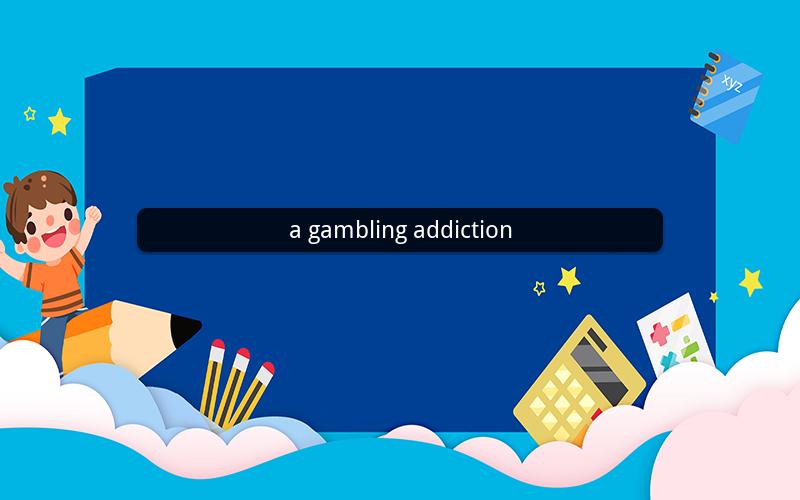
Contents
1. Understanding the Nature of a Gambling Addiction
2. Signs and Symptoms of Gambling Addiction
3. The Psychological and Emotional Impact
4. The Social and Financial Consequences
5. Treatment and Recovery Options
6. Prevention and Education
7. Support Systems for Those Affected
8. Case Studies and Real-Life Examples
9. The Role of Technology in Gambling Addiction
10. Future Trends and Challenges
1. Understanding the Nature of a Gambling Addiction
A gambling addiction, also known as pathological gambling, is a behavioral disorder characterized by an inability to control the urge to gamble. It is a complex condition that affects individuals of all ages, backgrounds, and socioeconomic statuses. Understanding the nature of this addiction is crucial in addressing its impact on individuals and society.
2. Signs and Symptoms of Gambling Addiction
Identifying the signs and symptoms of a gambling addiction is the first step towards seeking help. Common indicators include:
- Preoccupation with gambling, even when not gambling.
- Needing to gamble with increasing amounts of money to achieve the desired excitement.
- Repeated failed attempts to stop gambling.
- Feelings of restlessness or irritability when attempting to cut down or stop gambling.
- Returning to gambling after losing money in an attempt to recoup losses.
- Telling lies to hide the extent of gambling or the money lost.
- Risking or losing a significant relationship, job, or educational or career opportunity because of gambling.
3. The Psychological and Emotional Impact
The psychological and emotional impact of a gambling addiction can be profound. Individuals may experience:
- Depression and anxiety.
- Guilt and shame.
- Suicidal thoughts.
- Relationship breakdowns.
- Financial ruin.
4. The Social and Financial Consequences
Gambling addiction can have severe social and financial consequences, including:
- Loss of employment or income.
- Financial debt.
- Homelessness.
- Legal problems.
- Family breakdown.
5. Treatment and Recovery Options
Treatment for gambling addiction can vary depending on the individual's needs. Common approaches include:
- Cognitive-behavioral therapy (CBT).
- Support groups such as Gamblers Anonymous.
- Medication for co-occurring mental health disorders.
- Inpatient or outpatient rehabilitation programs.
6. Prevention and Education
Preventing gambling addiction involves education and awareness. This includes:
- Teaching responsible gambling practices.
- Promoting awareness of the risks associated with gambling.
- Implementing age restrictions and responsible marketing practices.
7. Support Systems for Those Affected
Support systems are essential for individuals struggling with a gambling addiction. These can include:
- Family therapy.
- Counseling services.
- Financial counseling.
- Legal assistance.
8. Case Studies and Real-Life Examples
Real-life examples and case studies provide insight into the experiences of individuals affected by gambling addiction. They highlight the challenges faced and the potential for recovery.
9. The Role of Technology in Gambling Addiction
Technology has both positive and negative implications for gambling addiction. Online gambling platforms offer convenience but also increased accessibility, which can exacerbate addiction.
10. Future Trends and Challenges
The future of gambling addiction treatment and prevention faces several challenges, including:
- The growing prevalence of online gambling.
- The need for more effective treatment options.
- Addressing the intersection of gambling addiction and other mental health disorders.
Questions and Answers
1. Q: What is the difference between problem gambling and gambling addiction?
- A: Problem gambling refers to any problematic gambling behavior that causes distress or harm, while gambling addiction is a more severe form of problem gambling characterized by an inability to control gambling behavior.
2. Q: Can a person recover from a gambling addiction?
- A: Yes, recovery from a gambling addiction is possible with proper treatment and support.
3. Q: Are there any genetic factors that contribute to gambling addiction?
- A: Yes, research suggests that genetic factors may play a role in the development of gambling addiction.
4. Q: How can I help a friend or family member with a gambling addiction?
- A: Offer support, encourage them to seek help, and be patient and understanding.
5. Q: Can medication help treat gambling addiction?
- A: Medication can be used to treat co-occurring mental health disorders that may contribute to gambling addiction.
6. Q: Are there any legal protections for individuals with gambling addiction?
- A: Some jurisdictions offer legal protections for individuals with gambling addiction, including bankruptcy protection and privacy laws.
7. Q: How can I recognize if I have a gambling problem?
- A: Look for signs such as preoccupation with gambling, increased spending, and negative consequences in your life.
8. Q: Can online gambling be addictive?
- A: Yes, online gambling can be addictive due to its convenience and accessibility.
9. Q: How can I support a loved one who is in recovery from a gambling addiction?
- A: Encourage them to attend support groups, offer a listening ear, and be patient as they work through their recovery.
10. Q: What role does society play in addressing gambling addiction?
- A: Society can play a role by promoting responsible gambling practices, providing support services, and raising awareness about the risks associated with gambling addiction.